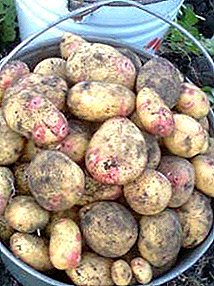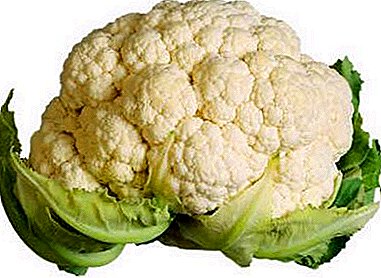 The beans today are undeservedly forgotten. But this plant, according to scientists, was the first of the vegetables cultivated by man. They received recognition in ancient Egypt, from the ancient Jews, Greeks and Romans. Today there are about a hundred of their varieties. A lot of useful properties, pleasant nutty taste, unpretentiousness, frost resistance - advantages of a bean can be listed for a long time. Dishes from them are delicious and satisfying. However, this plant can be dangerous. Many do not know the difference between beans and beans. Let's take a closer look at this amazing plant.
The beans today are undeservedly forgotten. But this plant, according to scientists, was the first of the vegetables cultivated by man. They received recognition in ancient Egypt, from the ancient Jews, Greeks and Romans. Today there are about a hundred of their varieties. A lot of useful properties, pleasant nutty taste, unpretentiousness, frost resistance - advantages of a bean can be listed for a long time. Dishes from them are delicious and satisfying. However, this plant can be dangerous. Many do not know the difference between beans and beans. Let's take a closer look at this amazing plant.
Calorie and chemical composition
Beans are outwardly different from beans, and from peas, and lentils. You can’t confuse them with anything - the flattened shape, color, depending on the variety, is green (unripe), yellowish, brownish, black-violet. This vegetable is rich in vegetable protein, contains almost no fat. Calorie is only about 57 Kcal. Beans have a diverse vitamin and mineral composition. They are rich in B vitamins (1, 2, 5, 6), A, PP, K, C, E.
Did you know? Legumes are capable of enriching the soil with nutrients: extract nitrogen from the air and concentrate it on its roots, remove phosphorus from the soil and absorb it.The unique combination of micro- and macroelements — potassium, selenium, iron, sodium, phosphorus, manganese, magnesium, zinc, molybdenum, calcium, etc. — gives them a special benefit.
The seeds of this plant contain many beneficial body and digestible amino acids, as well as fiber, lysine, pectins, phytates.
What are beneficial to the body?
One of the most important beneficial qualities of this plant is the abundance of easily digestible vegetable protein (this is especially important for children, vegetarians and vegans). 
The benefits of beans for the human body is primarily associated with its unique composition, they are:
- neutralize harmful substances (primarily preservatives) - due to the presence of molybdenum;
- reduce cholesterol. The usual course lasts 2-3 weeks - every day you need to use 100-150 g of beans (it is advisable to eat at least 15 kg per year);
- have a useful quality for dieters - low calorie beans and nutritional benefits are useful in diets;
- remove heavy metals and radionuclides (which is especially important for residents of industrial regions or areas with high radioactive background);
- help with indigestion - boiled and ground in mashed potatoes;
- used in the treatment of edema (in the form of a decoction of leaves and stems);
- promote faster maturation of boils and opening of boils, have anti-inflammatory effect. Apply gruel of beans to boils, which are boiled in milk;
- relieves irritation on the skin - rubbing a decoction of legumes;
- have a mild choleretic property;
- slow down the aging process, regenerate skin cells and nails;
- help reduce high sugar levels for diabetics;
- stabilize hormones;
- improve brain function (vitamins of group B);
- they prevent the absorption of excess fat and carbohydrates by the walls of the stomach, they quickly saturate;
- soothe and relieve stress.

It should be borne in mind that this vegetable can cause flatulence - complex sugars in its composition require special enzymes for their digestion. With regular consumption of this vegetable, the body begins to produce them, improves the work of the gastrointestinal tract as a whole.
Important! Beans do not accumulate nitrates and other harmful substances. It is an environmentally friendly product.
How to cook and with what are combined
The beans are self-sufficient in taste, but also perfectly combined with all vegetables, herbs, grains, nuts.
Eaten boiled or stewed - in the first and second dishes, salads, preserves. But they will be able to bring maximum benefit only when properly prepared.  Beans need to boil, and how much to cook - depends on the preliminary preparation. Before cooking, it is advisable to soak them for a period of 6 to 12 hours or more (up to a day) in cold water (3 parts to 1 part of the product) - this will accelerate further heat treatment.
Beans need to boil, and how much to cook - depends on the preliminary preparation. Before cooking, it is advisable to soak them for a period of 6 to 12 hours or more (up to a day) in cold water (3 parts to 1 part of the product) - this will accelerate further heat treatment.
Learn also about the benefits of legumes such as beans, peas, asparagus beans.In hot or warm water soak should not be - they can sour. Properly boil them for 1-2 hours, while salt and other spices should not be added (this will slow down the cooking process), also do not add cold water or put soda (it will destroy the B vitamins and spoil the taste).
Did you know? In Japan, this plant is considered a symbol of fertility and wealth.
How to cook the beans, prompted by numerous recipes that are rich in national cuisine (especially Mediterranean, Indian, Latin American). For example, Cuba traditionally cooks the perfect dish in terms of nutrition - a mixture of black beans and rice with tomatoes and greens.  Mediterranean cuisine offers many types of salads from boiled beans with additives from fresh onions, garlic, pepper, greens, olive oil and grape vinegar.
Mediterranean cuisine offers many types of salads from boiled beans with additives from fresh onions, garlic, pepper, greens, olive oil and grape vinegar.
The traditional puree of this product is made from steamed beans, peeled and transferred with olive or butter.
Did you know? The ancient Greek philosopher and scientist Pythagoras believed that in this plant are the souls of the dead, and never ate them.
How to store
To collect this vegetable should be after the pods dry and turn black - they are easy to peel off, and put them in a container with a tight lid. Keep them in a dry, dark place. This vegetable does not require special storage conditions. Periodically they need to be checked - whether the weevil has penetrated to them. Unripe beans can be frozen (pre-planted for a minute and dried). 
Contraindications and side effects
This product, despite all its beneficial properties and qualities, can bring harm to the human body and has certain contraindications. Definitely abandon their use should be people with diseases of the joints, gall bladder, suffering from rheumatism, patients with hepatitis and pancreatitis.
Important! In certain cases, the beans can cause poisoning - with poor heat treatment. Poisoning is manifested in nausea, headache, brown urine color.
Thus, we can conclude that this healthy vegetable should definitely be included in the diet.












